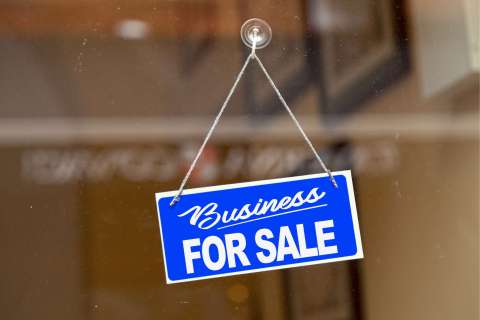New Year brings new ventures! If you are considering a new business in 2022, check out article with great suggestions and tips.
From finding the right business or franchise to buy, to finally accepting the keys to the front door - buying a business can be an extremely frustrating exercise. It is important that you plan and implement each and every step in sequence and avoid the many caverns on the road to completing the deal.
The following 10 points should always be in the back of your mind.
1. Do not buy or invest in a business that you do not understand or are not familiar with. This does not mean that you have to know every detail of the management and operation of that specific business. Hopefully, you will receive specific training from the current owner. What it does mean is that you should, at the very least understand the primary principles of the business.
We all understand the principles behind a retailer; buy product that appeals to the consumer at the lowest possible price and sell it at the highest price possible while maintaining the lowest overheads - simple! But, if the business you are considering is in the disposal of toxic waste, understanding the basic parameters of how the business operates and hence makes a profit could be completely foreign to you. The current owner of any business that is listed for sale will always tell you that running the business is relatively easy. It probably is relatively easy for the seller; he has had many years of experience that make it easy.
2. The complexities and timing of the transferring of knowledge from the seller to the buyer is relative to the type of business that is being acquired. A business that is very seasonal, should have a minimum of one full year of support from the seller in order to learn what occurs and how to manage and operate the business with each and every season. Make sure that you have an agreement on how and when the support and transferring of the seller's knowledge will take place. As an example, will you require that the seller be available some evenings and/or weekends? Is the seller planning on taking a three-week vacation in Europe the day after closing?
3. Before you buy a business, set a top price in your mind, that you can afford and that you think the business is worth. Don't ever be afraid or embarrassed to walk away. Don't become so involved in the actual "buying" of the business that actually consummating the deal becomes more important and exciting than the acquisition of the business itself. No business that I have ever seen is worth buying at any cost. Do not let yourself get caught up in the "its only another $25K" routine!
4. If you buy the shares of a business, you are acquiring "everything," that includes tax liabilities, lawsuits, and debt. Those that exist now and those that might appear in the future. There are methods whereby you can purchase the shares and the assets and not the liabilities. In this case, the liabilities fall back on the seller. However, you must remember that even if you do not buy the liabilities, as you own the shares, any and all lawsuits will be directed towards you (the corporation). The previous owner may have given you a multitude of "save harmless" clauses, which basically means that he will be responsible for any lawsuits or claims made against the company for things that occurred prior to you acquiring it. If something were to happen to the previous owner or he looses all his money in the stock market, you will end up being responsible for all of those liabilities.
In other words save harmless clauses are only as good as the person behind them. It is better to uncover any and all potential problems and deal with them before closing then it is to rely on save harmless clauses. As well, even if the seller is prepared to take care of any liabilities that are from the period that he owned the business, that might arise in the future, the time burden of dealing with those liabilities when they surface will still be your responsibility. It will be your company that will have to bare the potentially negative exposure and it will be your company that may be sued, and secondarily it may very well affect your future liability insurance rates as those rates are based on historic company claims.
5. Look at financing alternatives, owing the seller some money will give him an incentive to transfer his knowledge (he has a very good reason to help you succeed, he wants to get the balance of his money) and it will give you something to negotiate with if there are any financial disputes that appear after you have acquired the business. You can usually obtain much better terms from the Seller, depending on the Seller's reasons for divesting himself from his business, then you will from a bank or other financial institution.
However, you must be aware of one pitfall in borrowing money from the seller. In most cases his Non Compete Agreement, if there is one, will have a clause that states if you do not live up to the terms and conditions of the Loan Agreement that his Non Compete Agreement is null and void. In other words, you miss one payment and the previous owner may become your biggest competitor.
6. The seller's net weekly, monthly, and yearly cash flow is likely to be higher than yours due to the fact that he is not carrying the debt you incurred to buy the company. The seller also has years of experience and is likely to make fewer business errors and he will be much more efficient.
7. Warranty issues in any company involved in creating goods or supplying services can be a major liability. Most small businesses do not accrue any reserve for warranty expenses. It is important that the cost of warranty issues be resolved with the seller prior to acquiring the business. If you purchase the shares of the company, you are accepting any and all warranty liability costs and issues for warranty claims in the period prior to acquiring the business. Do not accept statements from the seller that warranty costs are very low. Very low in the seller's mind could be very high to you. Warranty bill backs, if there are to be any, to the seller should be defined in the agreements including labor costs (what rate) and material costs and terms of payment (will it be deducted from the buyers debt to the seller or invoiced to the seller weekly, monthly or quarterly and on what payment terms).
8. If you are acquiring a "service" business, remember that you are primarily buying a business whose assets are people. Buying people is always a dangerous game, because you can never be 100% sure that the people will stay on after you acquire the business. Before acquiring a service business, investigate the market for the skills of the types of individuals that you will be employing. Can your employees obtain equivalent and or better paying jobs somewhere else, is there a market shortage or a glut? This can usually be accomplished by reading the local newspaper classified ads. If you are looking at acquiring a business that does locksmith work and the local classifieds have ten advertisements from your potential competitors looking for locksmiths you may be acquiring a staffing problem! You can also contact some recruitment agencies in the area the business is located in and ask them if they have a lot of call for, or do they have a lot of people looking for work with those disciplines.
9. Once you have found a business that you want to acquire and have basically come to an agreement with the seller on the major terms and conditions one of the parties, the seller or buyer will "draft" the agreements. The party that drafts the agreements goes to his lawyer and has him produce a set of agreements that will be the agreements that both buyer and seller sign in order to consummate the transaction. The reason the term "draft" is used is because they are a set of documents, created by a party on one side of the transaction that have not yet been agreed to, or vetted by the other party. You may think that it is more economical for you to have the seller draft and it probably is, at least up-front. But it makes it a lot harder for you to add/or change things. If you draft then you start off with exactly what you want and the seller must take exception.
10. Conversely, if the seller drafts you are the one who must take exception. People have a tendency to accept the smaller things when presented to them, rather than appear petty by saying they want it changed. I have found that, in general, the party that drafts gets more of what he wants than the party that doesn't. As well, your lawyer will add the protection clauses that are appropriate for you as a buyer, where the seller's lawyer will generally not include those clauses.
There are always downsides or negatives with any business. The seller will always disclose all the upsides and the positives, the challenge, which is part of the due diligence exercise is to figure out what the negatives and downsides are.
Article Source:
Mobile Catering Business



